In a calamitous few months for Mexico’s diplomatic footprint and reputation in Washington, Mexican President Andrés Manuel López Obrador declared that he will boycott this year’s ninth Summit of the Americas, scheduled to take place June 6-10 in Los Angeles, if the Biden administration fails to invite Cuba, Venezuela, and Nicaragua. To top it off, he then blithely stated a week later that the U.S. “blockade” of Cuba was “genocidal.” This latest diatribe capped months of equivocal positioning by López Obrador regarding Russia’s unjustified invasion of Ukraine, including the president’s tone-deaf decision to abstain from suspending Russia’s status as a permanent observer nation at the Organization of American States and as a member of the United Nations Human Rights Council in Geneva.
The end result is bafflement and growing concern — both in the United States and among many foreign policy and media pundits and the opposition in Mexico — about why a president who had essentially ignored foreign policy during his campaign and his first three years in office (infamously asserting that “the best foreign policy is domestic policy”) has suddenly decided halfway through his six-year tenure to thrust himself into the mix and hog the foreign ministry’s bandwidth with a troubling and fraught style of personal foreign policy-making.
For a prickly and jingoistic leader who assiduously emphasizes that Mexico, like the rest of the world, should fundamentally mind its own business and not meddle — parapeted behind an obsolete vision of national sovereignty — in what he considers are solely the domestic affairs of other nations, López Obrador seems oblivious to the fact that his public sandbagging of President Joe Biden plays into the hands of the Republican Party and could politically corner the U.S. president, less than six months before the midterms. With Florida increasingly tilting from being a purple state to a red state, its large Cuban-American and smaller Venezuelan-American voting blocs are up for grabs as potential kingmakers — particularly in Miami-Dade, the state’s largest voter-rich county. Given former president Donald Trump’s successful pimping of Cuba policy to score electoral points and add the state to his 2020 Electoral College tally, the Mexican leader’s gambit puts the White House in an awkward position. The Biden administration must now find a way to address the threat of non-participation by an important regional partner, without appearing to kowtow to López Obrador’s demands and further alienating key voters in Florida, or even worse, making itself — and the president — look weak.
López Obrador’s decision to use Cuba as a foil is even more disturbing because he was conspicuously silent and never brought this issue up — some would even argue that he did not dare to — during the two years he coincided in office with Trump, a man whom he recently described as someone “he likes” and who rolled the clock back on the Obama administration’s efforts to slowly engage Cuba diplomatically. Given his sudden decision to burnish his pro-Cuba credentials, it could be construed by many observers in Washington that López Obrador is determined to undermine Biden, scupper the summit, and hand Trump and other Republicans a narrative of a U.S. president unable to successfully convene a summit of hemispheric nations.
Moreover, as two parallel tracks of globalization coalesce, one around the U.S. and another one around China, an anemic Summit of the Americas would be a geopolitical boost for Beijing. And while potentially having the leaders of the two largest Latin American countries not attend would be a slap in the face of the U.S., López Obrador and Brazilian President Jair Bolsonaro each have different reasons and political and diplomatic calculations for threatening not to participate. For starters, it would not be surprising that they both (along with some other leaders around the world) have reckoned that there is no pressing need to expend diplomatic capital in the relationship with this administration given that Trump — or the GOP, with which López Obrador and Bolsonaro both certainly feel more comfortable — might return to the White House in 2025. Both men clearly preferred and probably bet on Trump’s reelection over Biden. And while Bolsonaro still has not sat down with or talked to Biden, therefore making his first potential meeting in Los Angeles with his U.S. counterpart a tad awkward, he is in the midst of a tough electoral campaign and political battle with former president Luiz Inacio “Lula” da Silva, heading into the presidential elections in October. He therefore most likely would prefer to stay home than travel to California.
For his part, the Mexican president might have even decided that his government can afford to poke a finger in the eye of the current administration, because he considers he already has sufficient leverage over Washington with his support of U.S. requests for containing trans-migration flows northwards through Mexican territory. He may also wish to prove that he is not wholly subservient to U.S. interests, or he may feel boosted by the accolades he is getting from some regional leaders — in Honduras and Bolivia — about his threat to boycott the summit.
There are certainly other drivers of this decision. The rationale behind López Obrador’s ambush of Biden might be ideologically driven by a fondness for the Cuban regime and, as a politician who cut his teeth in the 1970s, a musty grasp of a bygone era of international and inter-American relations. It could also be driven by his inability to respond to Cuban requests for concrete support (by means of shipments of oil and/or funds), or even by something more inscrutable and troubling. After his official visit to Cuba this May, López Obrador announced that Mexico would take in another cadre of Cuban doctors. His trip and his decision to use Cuba again as an excuse to rattle his sabre over the U.S.’s hemispheric policy might also be explained by a potential growing dependence on Cuban intelligence, now that Mexico’s national security agency, CISEN, has been defanged and bureaucratically eviscerated by the president’s austerity measures and his purge of institutions and agencies he does not trust. It would also partly explain why, uncharacteristically for trips abroad by Mexican leaders, López Obrador traveled to Havana with his secretaries of the Army and the Navy. It could also simply be the president lashing out at a more assertive U.S. stance on Mexico’s energy policies or U.S. concerns over impunity and the record number of Mexican journalists killed so far this year.
Regardless of his motivations, boycotting the summit is an own goal for Mexico’s long-term strategic interests. For starters, López Obrador should realize that for a country like Mexico, not being at the table could entail that it ends up being on the menu, and that Mexican diplomacy, already impacted by Mexico’s inconsistent and disappointing positions regarding the Russian invasion of Ukraine, means that the country — both regionally and globally — will continue to punch below its weight in the international arena.
One of the unwritten rules — a paradigm even — of the relationship that evolved between Mexico and the U.S. since the successful negotiation of the North American Free Trade Agreement (NAFTA) and its side agreements in 1993 was to avoid surprising one another, and to minimize unilateral decisions that would catch either partner off guard. While Trump certainly dynamited that diplomatic practice — and many others — while in office, it’s now López Obrador’s turn to cross that red line with his grandstanding regarding the summit. It is one thing to advocate with Biden in a one-on-one phone call — as López Obrador did with Biden on April 29 — on behalf of the inclusion of all Latin American and Caribbean nations in the summit. It is a completely different matter to then divulge the demand in López Obrador’s daily press conference immediately after the call, and to then up the ante after the visit to Cuba and publicly launch an ultimatum the next day threatening to boycott the summit unless Havana is invited.
The test of belonging to the community of democracies is simple. Its proof is the degree to which an ally and partner is willing to cooperate to enhance the global commons, protect mutual values and interests and a rules-based international system, show solidarity with the peoples facing violations or constraints to their human rights, and call out democratic backsliding and authoritarianism. By embracing and providing cover to dictatorships and illiberal regimes in the Americas, López Obrador is ensuring that Mexico fails that test and becomes another poster child for nationalist anti-U.S. posturing in the region.
Moreover, he continues to believe — reverting to a stale practice from Mexico’s diplomatic manual in the 1970s that would thumb its nose at the U.S. in the region while maintaining a minimally functional relationship with Washington — that he can have his cake and eat it too when it comes to ties with the U.S., Mexico’s number one trading partner and the most important nation for its prosperity and wellbeing. With a more statesmanlike approach to foreign policy, he could also become Washington’s strategic partner of choice in the Americas. Instead, López Obrador has chosen the path of time-worn bromides and diplomatic irrelevance.
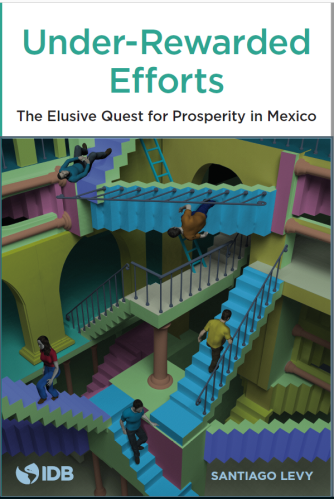
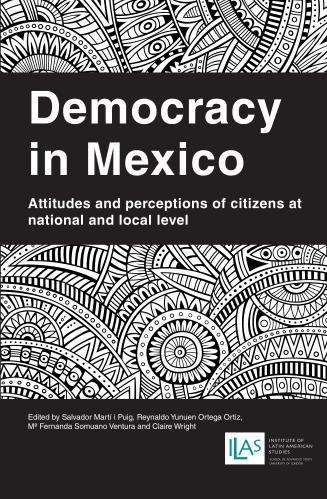
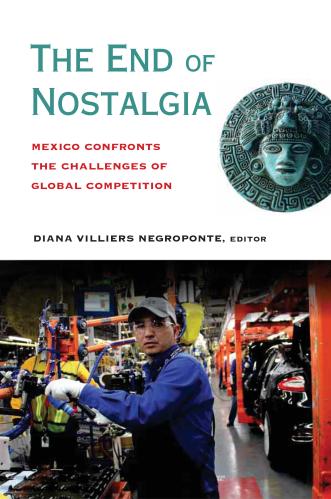
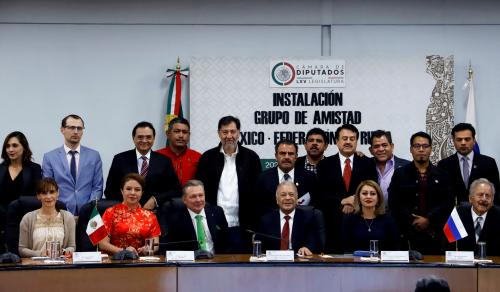
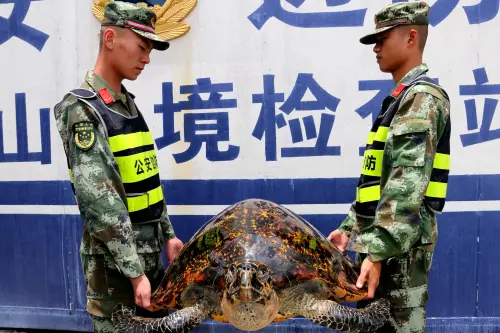
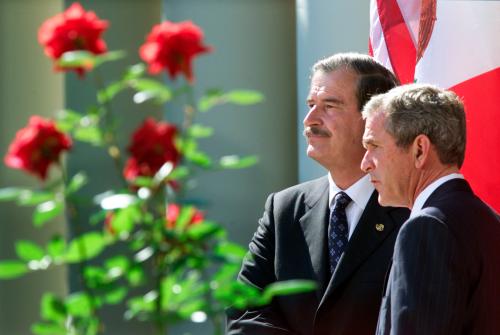

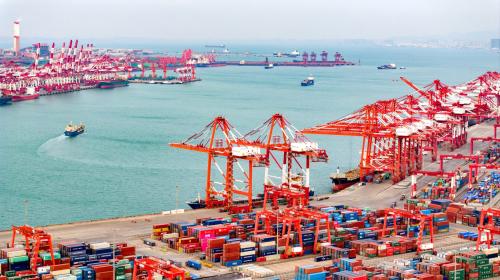
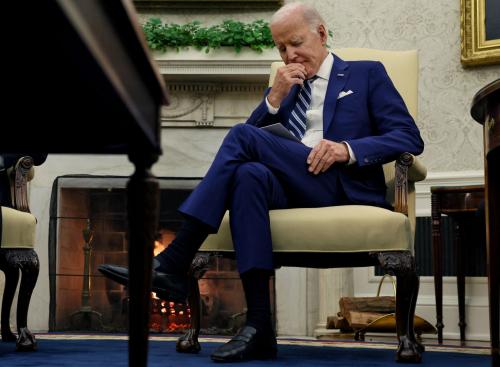

Commentary
Why is Mexico’s president snubbing Biden’s invitation to the Summit of the Americas?
May 24, 2022
Why is Mexican President Andrés Manuel López Obrador saying that he will not attend the Summit of the Americas?